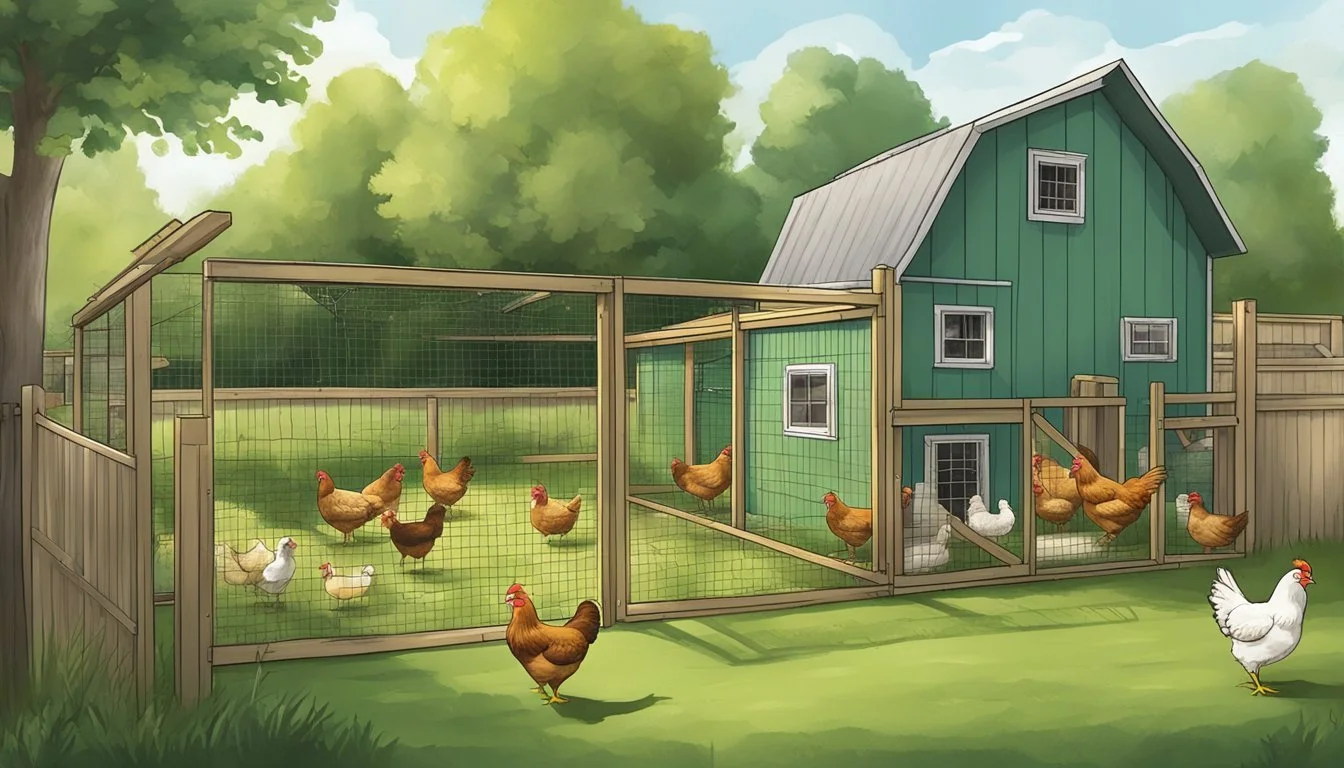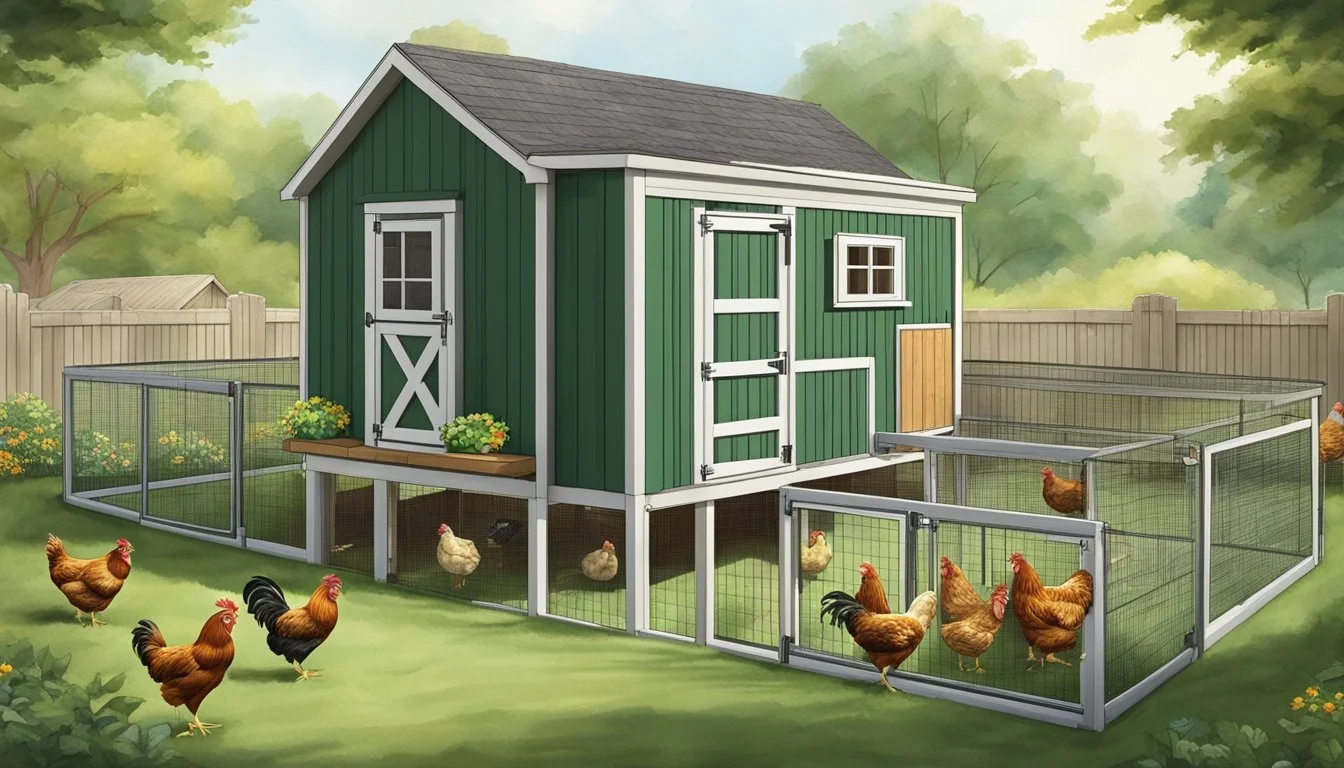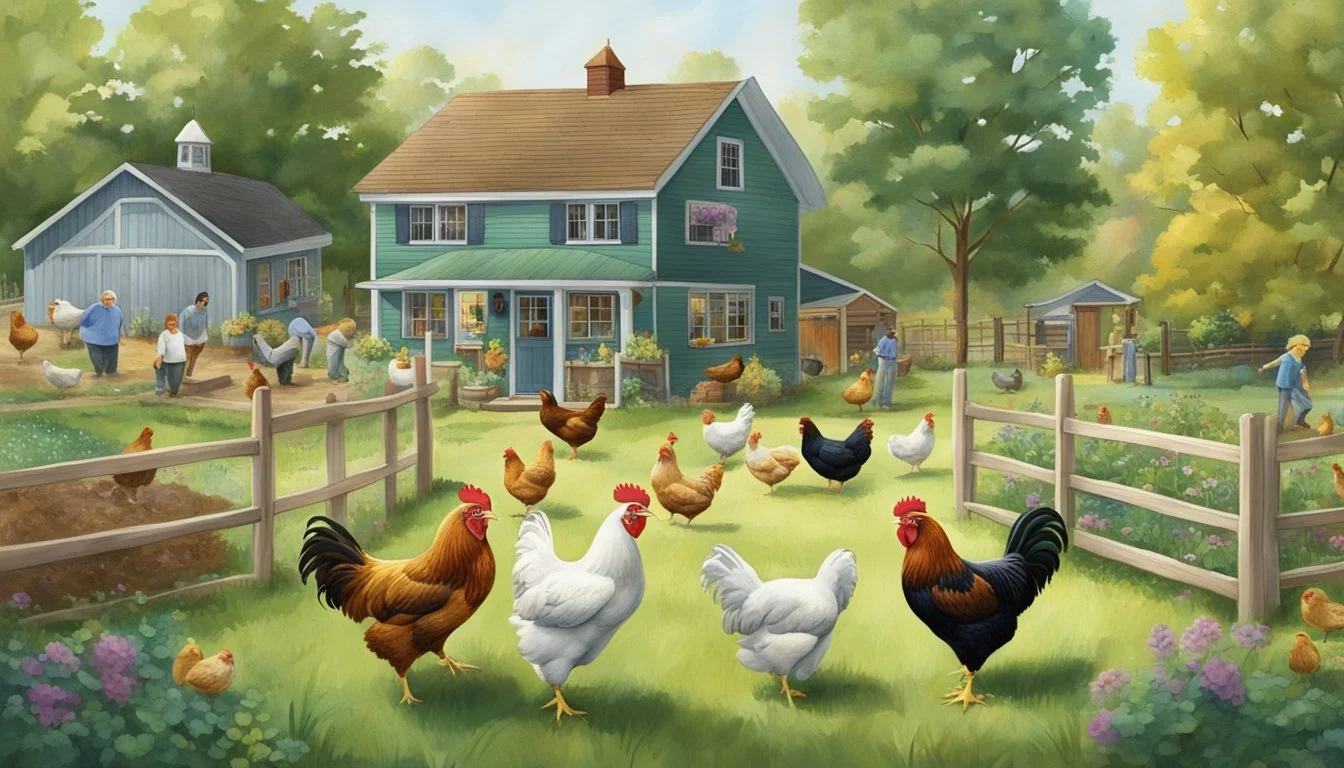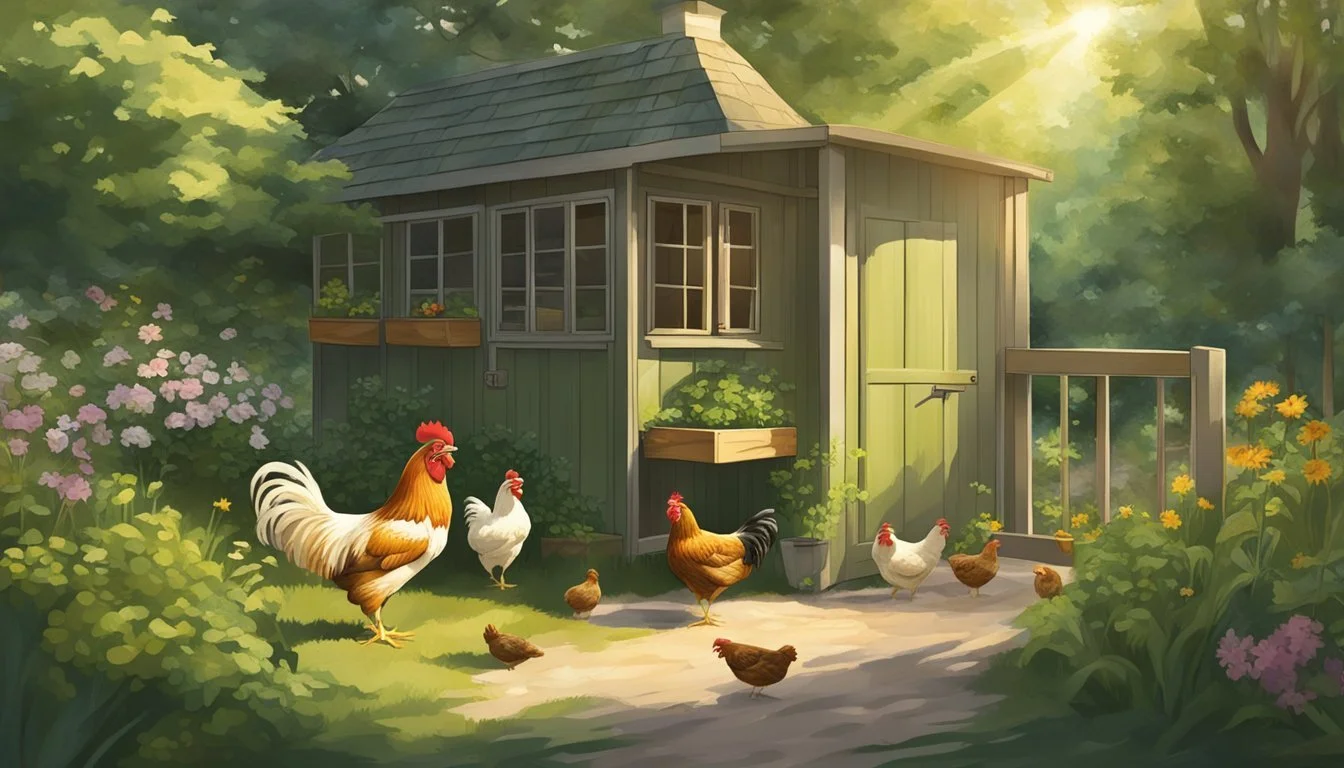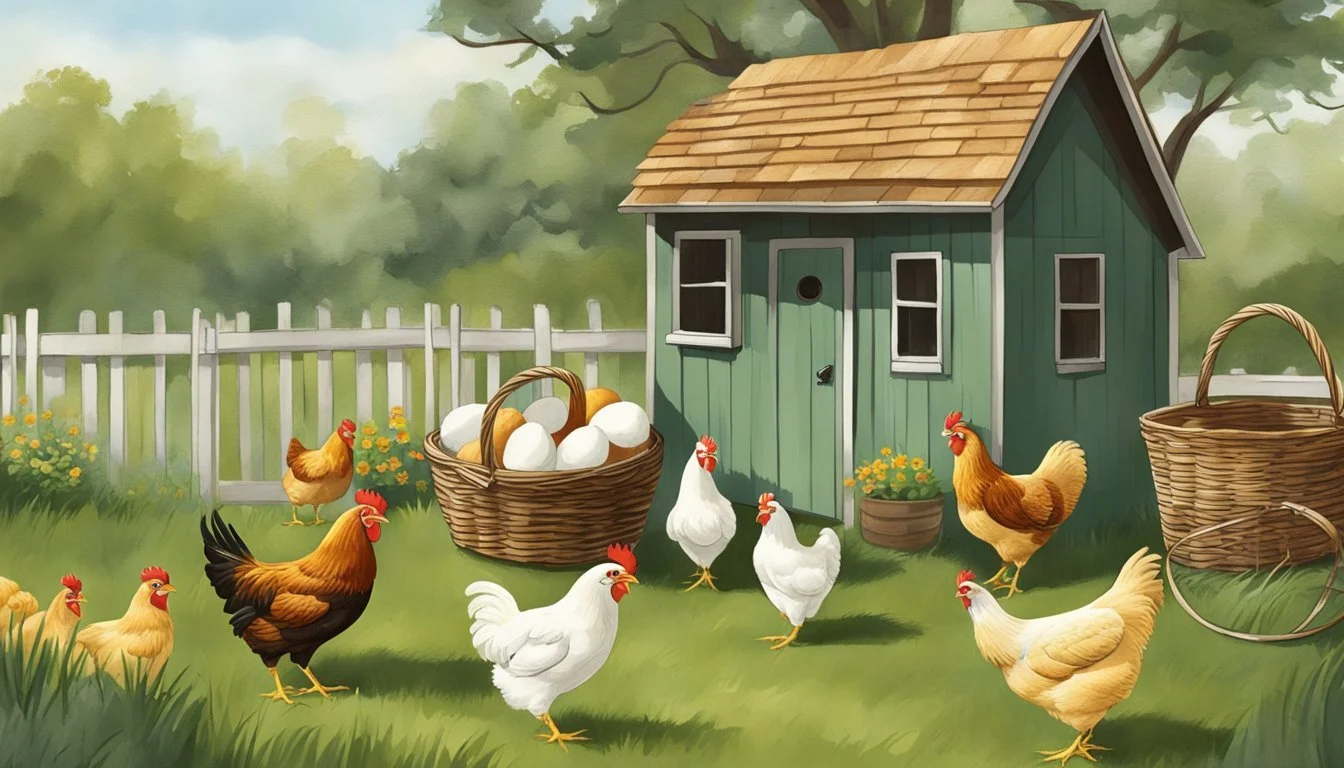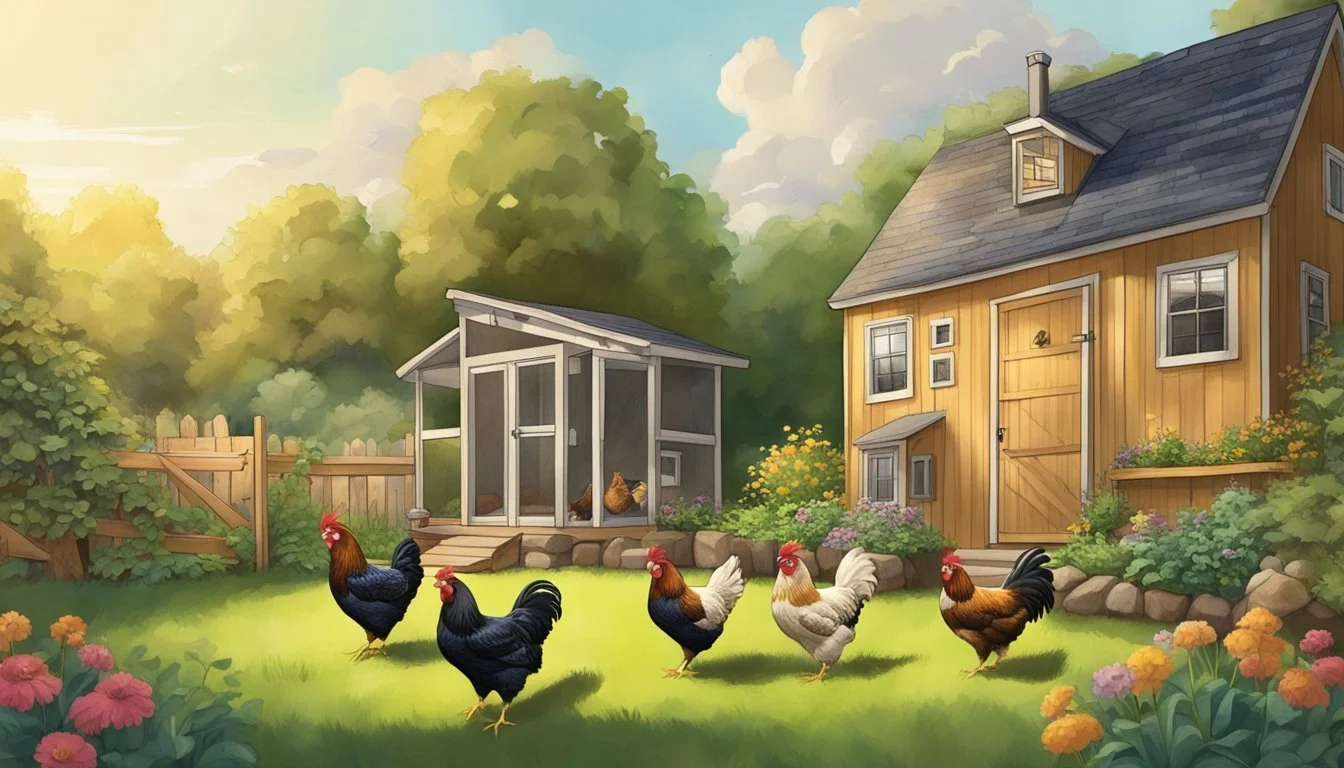Keeping Backyard Chickens in Green Bay, WI
A Guide to Urban Poultry Farming
Residents of Green Bay, Wisconsin, have the opportunity to embrace the growing trend of urban agriculture through the practice of keeping backyard chickens. This movement towards more sustainable and local food sources allows individuals to obtain fresh eggs, while also engaging in the care of these animals as part of their daily lives. In Green Bay, specific ordinances have been established to ensure that the activity is conducted in a manner that is considerate of community standards and animal welfare.
The city of Green Bay allows its residents to keep a maximum of four hens, but roosters are excluded from being kept in backyard coops to prevent noise disturbances. To engage in this practice, residents are required to obtain a license, indicating that the city has put measures in place to regulate and maintain control over the activity. While the city’s guidelines aim to balance the benefits of raising chickens with community concerns, it is important for potential chicken keepers to understand and adhere to these local laws to avoid any legal issues and to maintain harmony with their neighbors.
Throughout Wisconsin, regulations on keeping backyard chickens vary by municipality, with each setting their own rules reflecting local preferences and concerns. In Green Bay, the approach taken reflects a cautious but supportive stance for residents interested in pursuing this aspect of urban homesteading. As individuals consider integrating chickens into their backyard environments, compliance with these city-specific ordinances is a critical step in becoming a responsible chicken owner.
Understanding the Legal Framework
Knowing the different ordinances and regulations is crucial for any Green Bay resident looking to keep backyard chickens. The city has established rules that must be followed, including permits and licenses which are necessary before one can legally house chickens.
Relevant Ordinances and Regulations
The City of Green Bay maintains specific ordinances governing the keeping of backyard chickens. These laws require that chickens cannot reside in the main home or business past eight weeks of age and must be kept within contained areas, avoiding front or side yards.
Key Regulations:
Coop Distance: Coops must be at least 25 feet away from neighboring principal structures.
Zoning: Keeping chickens is permitted on parcels exceeding 10 acres and in areas zoned RR (Rural Residential).
Applying for Permits and Licenses
To legally keep chickens, residents must obtain the necessary permits and licenses as stipulated by local regulations.
Application Process:
Contact Name: Anita Raleigh, Green Bay City Deputy Clerk
Email: Email for contact
Residents should reach out to the city's contact person for detailed application procedures.
Restrictions and Requirements
Green Bay has a set of restrictions and requirements to ensure the wellbeing of backyard chickens and to maintain standards within the community.
Main Requirements:
Max Hens Allowed: Up to four hens are permitted per residence.
Roosters: Keeping roosters is not mentioned in the search results, additional inquiries with the city may be necessary.
Fenced Area: Chickens must be contained, ideally in a backyard setting.
Updates and Amendments
Local laws, including those on backyard chickens, can be subject to updates.
Latest Bill: Wisconsin legislators have introduced a bill aimed at creating a uniform baseline statute for backyard flocks.
Legislator Involvement: Republican Rep. Shae Sortwell and a Milwaukee Democrat have shown bipartisan support for this initiative.
Residents should keep informed on the latest legislation which could affect the regulations surrounding the keeping of backyard chickens. It's advisable to periodically check for any amendments and stay in contact with municipal authorities.
Designing and Managing a Chicken Coop
In Green Bay, Wisconsin, backyard chicken enthusiasts must prioritize the design and management of their chicken coops to ensure the health and safety of their fowl. An ideal coop provides comfort, security, and a clean environment while conforming to local ordinances.
Coop Design Essentials
The design of a chicken coop must balance space, comfort, and functionality. Each chicken requires at least 2-3 square feet inside the coop and 8-10 square feet in the outdoor pen. Essential components include:
Nesting Boxes: Minimum one box for every 3-4 hens.
Roosting Bars: Provide sufficient space for all chickens to roost comfortably at night.
Ventilation: Good airflow is crucial to maintain a clean air supply and reduce dampness.
Insulation: Proper insulation is important to safeguard chickens from Green Bay's cold winters.
Ease of Access: Design the coop to be easily accessible for cleaning and egg collection.
Coop Maintenance and Sanitation
Keeping a coop clean and sanitary is vital for the health of the chickens and to control odors. Owners should:
Remove droppings daily: Minimize ammonia and pests.
Refresh Bedding: Replace straw or shavings routinely to maintain a dry environment.
Deep Clean: Schedule a thorough clean quarterly to scrub surfaces and disinfect.
Control Pests: Regularly inspect for and address any signs of pests or vermin.
Protection from Predators
Security is paramount in coop design to protect chickens from predators. Effective strategies include:
Sturdy Pen: Construct a secure outdoor pen with hardware cloth buried at least 12 inches underground.
Locking Mechanisms: Use raccoon-proof latches on all coop doors.
Inspect Regularly: Examine the coop and pen for any potential weaknesses or breaches regularly.
By adhering to these design and management principles, owners can create a thriving environment for their backyard chickens.
Chicken Husbandry Best Practices
Proper feeding and healthcare are essential for maintaining a healthy flock of chickens in Green Bay. By adhering to best practices in these areas, owners can ensure that their hens are well-nourished, and diseases are prevented or promptly managed.
Feeding and Nutrition
Chickens require a balanced diet to thrive. Their nutritional needs vary according to their stage of life—chicks, growing pullets, and laying hens each have specific requirements.
Chicks (0-8 weeks): Provide starter feed with 18-20% protein to support rapid growth.
Pullets (8-20 weeks): Gradually transition to grower feed containing 16-18% protein.
Laying Hens: A layer feed with 16% protein and increased calcium is crucial for egg production.
Consistent access to clean water is critical. A good practice is to have one waterer per ten birds, making sure it's refreshed daily.
Healthcare and Wellness
Routine health checks and preventive measures are key to chicken wellness. Owners should regularly inspect their chickens for signs of illness, parasites, or injury.
Here's a basic healthcare checklist:
Observe for abnormal behavior or changes in appetite.
Check for lice, mites, and other parasites.
Ensure vaccinations are up-to-date where applicable.
Proper shelter and space help prevent stress and disease. Ventilation is essential to remove dampness and ammonia, while roost space should be ample to accommodate all hens comfortably with about 8-10 inches per bird. Roosters are often not permitted in urban settings, including Green Bay, and are not required for hens to lay eggs.
Community Relationships and Impact
Keeping backyard chickens in Green Bay, WI, influences both neighbor relations and the local ecosystem, affecting community dynamics on a residential scale. Proper understanding and management of these relationships can enhance community engagement and support sustainable practices.
Neighbor Relations
Backyard chickens can be a point of community engagement but also a potential source of conflict. Homeowners with chickens must stay conscious of their neighbors, maintaining open communication to address any concerns regarding noise, smell, and property boundaries. Clear guidelines, which stipulate that residents can have up to four hens and must buy an annual $5 license, provides a framework for keeping peace.
Open Communication: ensures neighbors are informed and any concerns are proactively addressed.
Property Boundaries: maintaining coops within designated areas to respect space and privacy.
Local Ecosystem Impact
The presence of chickens in residential areas also bears an impact on the local ecosystem. Hens contribute to pest control by eating bugs, which can be beneficial in reducing the reliance on chemical pesticides. Moreover, chickens can aid in weed management due to their foraging behavior, which helps to naturally control unwanted vegetation.
Pest Control: chickens consume bugs like ticks, beetles, and flies.
Weed Management: their scratching and pecking can help keep weed growth in check.
Chickens also produce waste, which can turn into a valuable fertilizer for gardens, further engaging residents in sustainable practices. However, it’s crucial to manage this aspect carefully to prevent any negative environmental impacts, such as runoff into local waterways.
Supplemental Information
This subsection provides insight into the specific species and breeds of backyard poultry suitable for raising in Green Bay, Wisconsin, along with the benefits they offer.
Species and Breeds
When discussing household livestock animals within the context of Green Bay's right to garden, it is important to note that residents are limited to keeping chickens exclusively. The types of poultry permissible for backyard keeping are:
Hens: Specifically, up to four hens without roosters are allowed.
The focus is typically on common chicken breeds known for their egg-laying capacity and temperament conducive to suburban living. Breeds such as Rhode Island Reds, Plymouth Rocks, and Sussex are popular choices. Other poultry, like ducks, geese, quail (What wine goes well with quail?), or guinea fowl, are not under the current allowance within the city's guidelines.
Benefits of Raising Chickens
Chickens provide a host of benefits for the family from a health and flavor standpoint. Fresh eggs from backyard chickens are often considered superior in taste and nutrition compared to store-bought eggs. Moreover, they offer a sense of food independence and contribute to a sustainable living practice.
Health Benefits:
Nutrition: Eggs from backyard chickens can be fresher and thus retain more nutrients.
Physical Activity: The daily routine of caring for chickens encourages outdoor activity.
Additional Advantages:
Educational: Families with children may find chickens a valuable educational resource in teaching responsibility and the basics of animal care.
Emotional: Interacting with chickens can have a calming effect and provide stress relief.
Regulations Beyond Green Bay
When exploring the backyard chicken laws outside of Green Bay, one will notice a variation in local ordinances and state-level insights, reflecting differing approaches toward urban poultry farming.
Comparison with Nearby Cities and Counties
Kenosha: Homeowners are permitted to keep chickens with certain conditions, such as coop specifications and distance from neighboring homes.
Madison: Here, residents can keep up to four hens but no roosters, similar to Green Bay's ordinance, though the specifics may vary.
Milwaukee: The rules are more lenient, allowing for a greater number of chickens under certain permit and space requirements.
Appleton: Residents must adhere to specific ordinances that regulate the number of hens and the requirement of a license or permit.
Racine: The city has its own set of rules with respect to coop construction and distance from property lines.
In Brown County, which includes Green Bay, local municipalities may have additional or differing regulations that need to be checked on a case-by-case basis.
State-Level Legislation Insights
In Wisconsin, there are no overarching state-level laws that prohibit the keeping of backyard chickens in its cities; rather, the state allows local jurisdictions to set their own regulations. As one of the state's largest cities, Green Bay's ordinance is often a point of reference for comparison. It is essential for residents to consult their specific city regulations, as these can greatly differ from Green Bay's approach and from each other, even within the same county.
Jurisdictions across the state have recognized the growing trend of urban poultry farming, and regulations are frequently updated to address the nuances of urban agriculture. Residents of Wisconsin interested in keeping backyard chickens should conduct a thorough review of their local laws and stay abreast of updates to remain compliant.
Additional Resources
In Green Bay, Wisconsin, residents seeking to keep backyard chickens have a variety of resources available for education and legal guidance. The following subsections provide specifics on where they can find educational materials for proper poultry care and whom to contact for advocacy or legal matters related to their backyard flocks.
Educational Materials and Workshops
Residents can access educational materials and attend workshops tailored to the care and management of backyard chickens through local agricultural extensions and public libraries. The Brown County Library often hosts events and provides resources that give invaluable insights into chicken care. Additionally, materials on zoning laws pertinent to residential structures are provided to ensure Wisconsinites are well-informed.
Educational Opportunities:
Brown County Library: Seasonal workshops and ongoing access to chicken care publications
Cooperative Extension Services: Offers programs and literature specific to poultry husbandry in urban settings
Advocacy and Legal Support
Navigating municipal regulations regarding backyard chickens can be complex. For those needing assistance or advocacy, several organizations within Green Bay and statewide platforms are available. These groups provide residents with up-to-date information on the latest ordinances affecting various jurisdictions in Wisconsin, including Green Bay.
Legal Resources and Support:
City of Green Bay City Clerk's Office: For inquiries about current regulations and acquiring a chicken license
Local animal welfare organizations: Offer guidance and support in understanding and complying with local laws
By utilizing these resources, individuals can remain informed on best practices for keeping backyard chickens and the ever-evolving legal landscape in Green Bay, Wisconsin.
Personal Stories and Case Studies
This section provides insight into the experiences of individuals in Green Bay who are raising backyard chickens.
Local Green Bay Residents
Emma Schmidt: A resident of the village of Denmark, Emma has successfully set up a chicken coop in her backyard. Her journey began as an attendee at the Mishicot Pumpkin Fest, where she was inspired by a seminar on sustainable living. She now has a thriving flock that provides her family with fresh eggs daily.
AmyRose Murphy: AmyRose, living in unincorporated Manitowoc County, faced initial challenges due to zoning regulations but worked with her local government to gain the necessary permissions. Her story showcases the importance of understanding local ordinances.
West Allis Influence: While not a resident of Green Bay, an individual from West Allis, who often wears their 'Trump 2020' t-shirt, has influenced some Green Bay citizens with their practical coop designs and chicken-rearing techniques. This exchange of ideas demonstrates a sense of community among chicken owners.
Resident Name Location Contribution to Local Community Emma Schmidt Village of Denmark Demonstrates sustainability in practice AmyRose Murphy Unincorporated Manitowoc County Advocated for backyard chicken allowances West Allis Influencer from outside Green Bay Shared coop design and rearing tips
Local residents have diverse experiences with raising backyard chickens. They highlight the importance of community learning and adapting to regulations for successful chicken keeping.
Frequently Asked Questions
Are backyard chickens allowed in Green Bay, Wisconsin? Yes, residents are permitted to keep backyard chickens under local regulation, but there are conditions to comply with.
What is the maximum number of hens one can keep? A resident can have up to four hens for residential use. It is important to note that only hens are allowed; roosters are not permitted due to noise concerns.
Do I need a license to keep backyard chickens? Indeed, one requires a license for keeping chickens. Prospective owners should contact the City of Green Bay to obtain the necessary documentation.
Can chickens be kept on any size property? Local ordinances typically dictate space requirements. However, as a general practice, keeping chickens on a reasonable residential lot size is acceptable, provided that they do not cause disturbances or violate other city codes.
Is the slaughter of chickens allowed within the city limits? The slaughter of chickens is generally regulated, and in most urban settings, it might be prohibited for reasons related to public health and community standards. One should consult the specific local regulations of Green Bay for details.
Are chickens considered pets or livestock? Chickens can be considered pets; however, they are also classified as livestock. Their categorization can affect the local regulations that apply to them, including where and how they can be kept.
Where can I find detailed information about local chicken laws? One can find precise rules and regulations on the official Green Bay city website or by visiting ChickenLaws.com for summarized information. It is recommended to read through the city's animal ordinances for comprehensive guidance.


